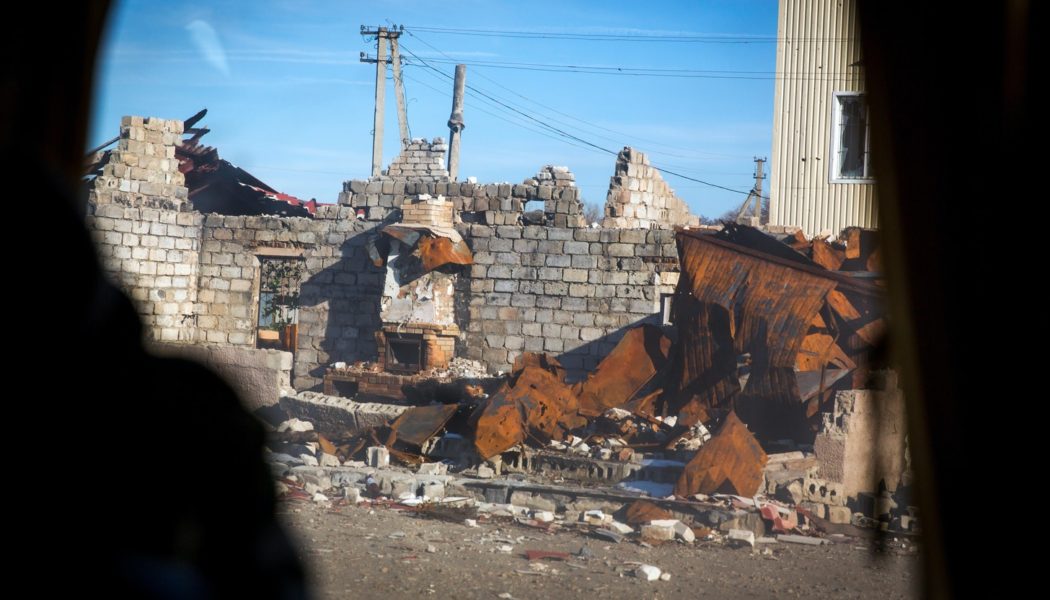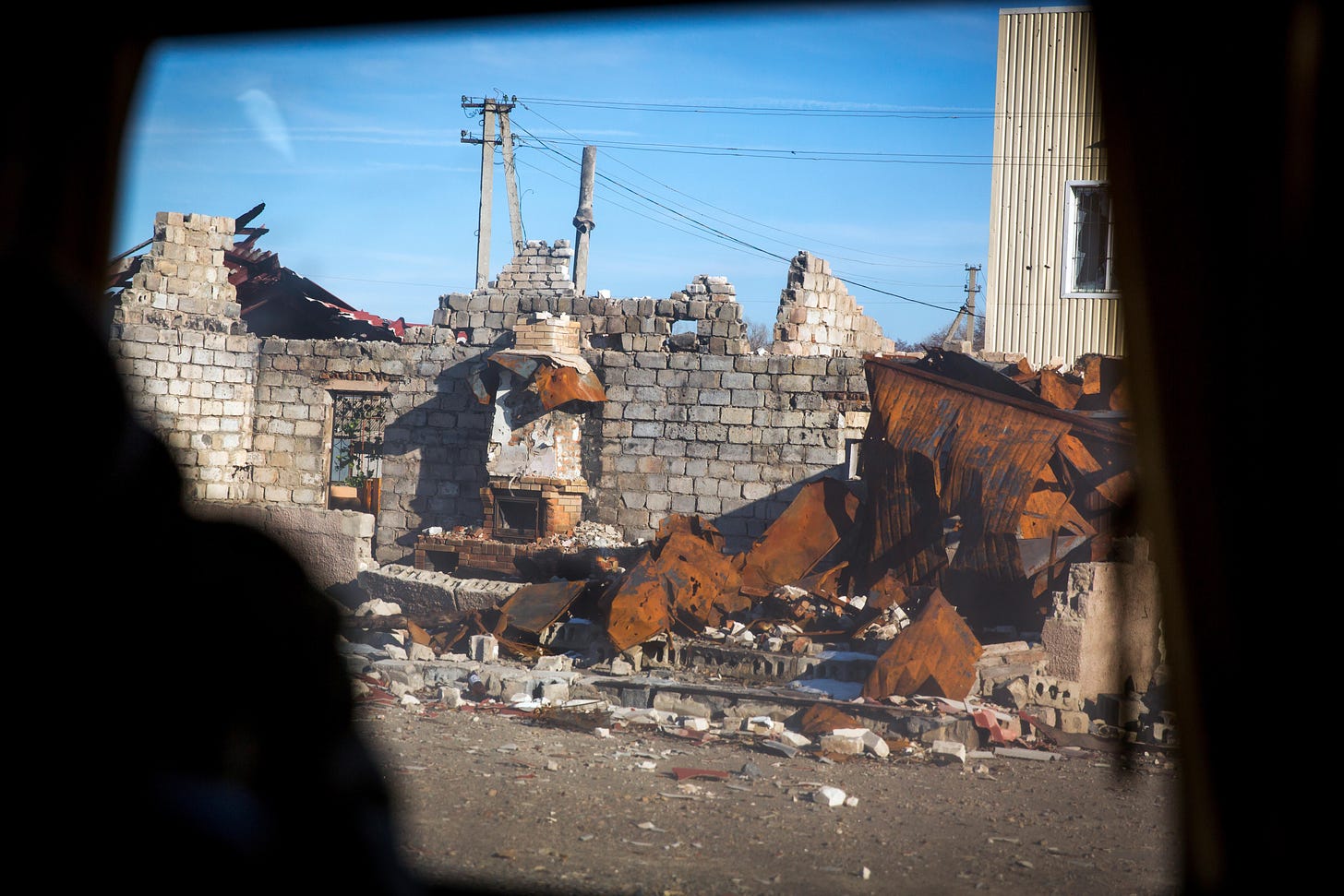Happy Friday friends,
After Russia’s invasion of Ukraine Thursday morning, fighting continues throughout much of the country.
Although the Vatican, as a rule, maintains diplomatic neutrality in all conflicts, always calling for peace, Pope Francis made the extraordinary gesture of going to the Russian embassy this morning to express his anguish at what is unfolding.
We talked yesterday with Bishop Andriy Rabiy of the Ukrainian Greek Catholic Church about what has happened, the history of the two countries, and what it means to have “hope” while your home is being invaded.
“People are trying to make sense of what is going on, they are overwhelmed, in shock, it is hard to think clearly,” Rabiy told us.
But the bishop was clear: Christians, Ukrainians, and especially Ukrainian Christians have a very particular mission right now:
“It’s not time to start ‘whining’ so to speak, it’s time for us to pull ourselves up. As spiritual people this is what we are supposed to show, hope: that God will provide, that everything is in His hands, and we believe in it.”
It’s an uncompromising message. But this is an uncompromising reality Ukraine is facing.
The whole interview is here, and I encourage you to read it.
—
If you’re offering prayers for Ukraine right now, and we all should be, here is our primer on some of the sainted and blessed men and women of that country whose intercession is surely needed. We’ll add some Ukrainian saints to our list in the days to come.
In Other News
A civil lawsuit was filed Tuesday against Bishop Richard Stika of Knoxville, Tennessee. The suit alleges that a former parish organist was raped by a a diocesan employee and seminarian, and that Stika impeded a diocesan investigation into his allegation.
After the alleged rape, and after the bishop gave the organist a gift a few days later, and after the bishop claims he investigated the allegation, he sent the seminarian off for studies — he was then dismissed from his seminary because of new sexual misconduct allegations.
The Pillar was the first to report most of those allegations last year, and to report on a Vatican investigation into Stika’s leadership.
Bishop Stika told us last year that, indeed, he did remove the investigator appointed by the diocesan review board, because he showed up at the chancery “asking all these questions.” The bishop also told us that he believed the seminarian was the real victim.
You can get up to speed on the lawsuit, and all the allegations Bishop Stika is facing, here.
—
The situation in Knoxville has rumbled on for nearly a year now, and it continues to raise a lot of questions. Perhaps the most obvious question being: what the hell is going on?
But what will Rome do?
Although Rome did receive complaints from multiple diocesan clergy last year, and ordered an investigation into Stika by the local metropolitan archbishop, no official result has been announced — indeed there has been no official announcement of the investigation having opened or closed.
At the same time, the bishop has repeatedly told his priests that he’s the victim of gossip and a smear campaign. He’s also told people he has already been exonerated by Rome, and repeatedly claimed that apostolic nuncio, Archbishop Christophe Pierre, told him he has “nothing to worry about.” It’s not clear that the Vatican or the nuncio are aware of that, though.
As JD notes, while the lawsuit brings a new series of allegations, and a new round of media coverage, it probably also pushes any decision or public statement by Rome further back. That may not sound great, but it may be the logical conclusion to draw.
—
In this week’s conversation with an interesting person, Charlie Camosy talked to Michael Vanderburgh. Michael is a lot of things: He’s a husband, a father, an ex-cop. He’s also a survivor of clerical sexual abuse.
Unfortunately, that last part is an experience he shares with far, far too many people. But something I don’t think he has in common with anyone is what he did after reporting his experience to the local archdiocese: he became their biggest fundraiser.
Here’s something else he did while he was in that job — Michael struck up a relationship with Frank, a 90-year old priest living a life sentence of “prayer and penance” for abuse, trying to make sense of the most scandalous part of our Catholic society. He learned a lot along the way:
“Over the years, I’ve worked pretty closely with more than 200 priests. Sadly, fewer than a third of them demonstrated to me any personal sense of vulnerability and humility, both of which are essential for a priestly vocation.
Frank was always very vulnerable and humble with me. He was very forthright in answering every question that I had, and he taught me a lot about the personal suffering that free will can choose.
Though I don’t believe that he was able to comprehend the severity of his crimes, he sought to be the best he could be for God. My short relationship with Frank underscored the necessity of mercy in my Christian journey.”
That’s a survivor of abuse talking about an abuser. It’s not the kind of thing you’d expect to hear.
—
In case you missed this week’s episode of the Vatican financial soap opera: Gianlugi Torzi is back in the news, again.
If that sounds like a story you’ve read already, well, good for you — you’ve been paying attention. Torzi has already been implicated in several similar schemes in Italy, often involving Catholic hospitals.
This is, by my count, the third time Torzi’s been put in the frame for selling dodgy hospital debt products. And then there are the charges of fraud and tax evasion in a separate Italian legal case, on top of the Vatican trial.
Torzi has maintained his total innocence in all these cases. While seemingly not keen on the idea of actually turning up for any trials in person, he remains confident the courts will see him for what he is: apparently just the most unlucky and misunderstood businessman in the world, I guess.
Calvinball
The Russian invasion of Ukraine has been gut wrenching to watch. The seemingly inexorable buildup and the diplomatic kabuki theatre merely added a prologue of sickening inevitability to what is now playing out.
Now, I freely admit, I am not a geopolitical analyst, and outside of a brief foray into international development, foreign policy has never been my brief. But at several points in the last few days I have been reminded of the omnishambles of the Afghanistan withdrawal last year, and the apparent failure to learn at least a few of the lessons which suggest themselves, at least to me.
Something which particularly struck me last year, and has again now, is the U.S. government, especially the State Department’s, belief in social media pressure and opprobrium as things of weight and consequence, contrasted with the Taliban and now Putin’s surprising indifference to tweets.

The eyes of the world are watching, our diplomats have repeatedly warned, only to court the obvious response from the other side: “Yeah? Watch this.”
It seems hard to escape the conclusion that U.S. diplomats are — or until Thursday morning were — living is a different world than Russia, one in which tweets like this one, sent after the embassy staff had already left the country, transmitted steely resolve, not adolescent impotence.
It is painfully obvious to everyone now, as it sadly has been to Ukrainians for years, that Russia is not playing by the same rules as other nations. Few Western conceits have aged as badly as the so-called “end of history” narrative, but one of its lasting legacies has been the seeming inability of many people engaged in high level statecraft to understand the game they are in.
If your whole training and career has been premised on the idea that history is over (and “we” won), and everything else is just a little light mopping up, you accept as reality that some things, like land wars in Europe, simply cannot happen — they just aren’t within your frame of conception.
Even as the invasion was about to get underway, the U.S. government’s position seemed to be aware yet uncomprehending: making much of how they knew what was about to happen, and yet stunned to find they hadn’t called a bluff.
It seems that sending tanks over the border toward Kyiv isn’t just wrong, by their lights, it is an act of incomprehensible madness, like wearing ice skates on a basketball court.
The problem is, the rules of international relations aren’t fixed, they’re fluid. At its most basic level, statecraft isn’t basketball, or hockey, it’s pure Calvinball, the only rule is: the guy with the ball makes the rules.
If you think that is an exaggeration, consider the split-screen farce of Russia simultaneously invading Ukraine and chairing the UN security council meeting on the invasion. Putin doesn’t strike me as crazy, so much as lethally indifferent.
Sanctions have been announced, for sure, and Russia has been officially declared a pariah state, but no one seriously considers that this wasn’t expected in Moscow — and Putin doesn’t seem to care all that much if he’s “canceled.”
Indeed in some NATO countries, like Italy, even talk of sanctions has been greeted hesitantly because of the real-word reliance on Russian energy, and it’s an open question how long European resolve will hold to any kind of meaningful support for Ukraine. Especially once the refugees start arriving.
This isn’t to say the options box is empty, or that permanent Russian control of Ukraine is a forgone conclusion and will inevitably lead to similar action against a NATO member like Latvia or Lithuania. Or that China will inevitably risk the mean tweets to do the same to Taiwan.
But it’s hard to see another result when only one side seems to understand the rules of the game being played.
It would be all too easy to clock this up as a comical inability to see that, far from having stopped, the wheel of history is very much on the turn, if it were not for the heartbreaking reality facing the families of Ukraine.
Behind the curtain
The situation in Ukraine is not going to resolve in a news cycle, or in a few days or weeks. Indeed, taking even a passing look at events, the last few days are simply a crescendo which has been building for the last eight years.
We will keep following events as they happen. And, to that end, just this week we’ve added a Ukrainian correspondent at The Pillar, from whom you will be hearing soon. It’s one of several ways in which we want to grow the work we do here — covering the news in-depth, with seriousness, and informed by the teaching of the Church.
To do this, we have to grow our business as well. We’ve made a point of not selling any part of the company, or parting with any scrap of our independence — and we rely on our subscribers and supporters to allow us to keep doing the news the best way we know how.
And here, as we look to keep growing, I want to give you a peek behind the curtain. We could keep banging on every week for more of you who read these newsletters to join us as paying subscribers — and really, if you aren’t one, please do sign up.
That having been said, we also know that by all the standards we can find, we’ve been very fortunate in the generous (but definitely minority) percentage of readers who elect to become paying subscribers. They keep The Pillar free for those Catholics, including priests, religious, bishops — monasteries of nuns even — who read The Pillar around the world, and are not able to afford the subscription.
We have every reason to hope that as our readership grows, so, too, will the people willing to help us keep The Pillar going and — as importantly for us — free to read.
In the meantime, we don’t want to keep haranguing you readers every single week— you are already generously doing what you can in what we know are often difficult circumstances.
So, we’re taking the measure of what we can do in terms of advertising and other ideas that would help us keep growing. But some of you have written to us, saying you’d like to do more to support the project, so here’s an idea:
We’ve been wondering if we could find a group of readers who’d consider subscribing at a higher rate, say $1,000 per year.
If that seems like a lot, well, to many of us it is. But we’re a big family here reading these newsletters, and if that sounds doable to only a tiny percentage of us — that could be transformative for The Pillar in the next twelve months.
What’s the money for? We want to add more correspondents from different parts of the world. In some cases we have ideas about who we’d like them to be. We also want to broaden our podcast offerings beyond our weekly show. And, let’s be honest, we could use a website upgrade.
What do these generous souls get? Well, they get to help this project grow in real ways. And while clicks might not earn us a penny, we think the size of our readership shows there is a need for the kind of journalism we are trying to do — and there’s nobility in helping meet that need.
We’re open to doing other stuff to say “thank you” as well, if people have ideas. I know some outlets do monthly briefing calls or Zoom drinks nights, and things like that. Truthfully, we are open to suggestions.
I’d like to say we’d offer such people swift and personal returns to emails they might send about things we’ve written or ideas they have, but we try to do that already for every reader who takes the time to write to us. That’s how it is here: we really do value every subscriber we have, and we really do think it’s totally normal when you email us, and totally normal to expect us to write back.
Anyway, this is the stuff we’re thinking about in between trying to do the news all week. Let us know what you think, and if you’re one of the happy few who can help us get where we’re going faster — please let us know.
See you next week,
Ed. Condon
Editor
The Pillar
Join Our Telegram Group : Salvation & Prosperity








![Los Angeles DA George Gascon violates key policy in Bishop O’Connell murder case; “doesn’t know basic ethical rules or doesn’t care” [warning: autoplay video]…](https://salvationprosperity.net/wp-content/uploads/2023/03/los-angeles-da-george-gascon-violates-key-policy-in-bishop-oconnell-murder-case-doesnt-know-basic-ethical-rules-or-doesnt-care-warning-autoplay-video-327x219.png)


